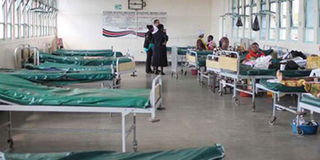Govt must fast track end to doctors’ strike

A half-empty hospital ward. Some patients have voluntarily deserted hospitals, returning home or swapping to shrines of traditional healers and witchdoctors due to the doctors' strike. FILE PHOTO
What you need to know:
- This failure to get treatment at a government health facility is likely in future to worsen the largely poor health-seeking behaviour of Ugandans.
- Let the Ministry of Health refocus its priorities.
- They can and must offer to engineers technical considerations for most usable design, but quickly return to the wards or community sensitisation where their expertise is most required.
The government and striking doctors have announced progress in talks that presents prospects that the industrial action could end today or within the week.
They began the industrial action on November 6, demanding higher salaries; better perks including vehicles; disbandment or restructuring of the State House-run Health Monitoring Unit; sustained stocking of medicines and medical supplies; and, better welfare and quality training for Interns and Senior House Officers (doctors pursuing graduate studies).
An end to the strike has been premised on the government’s written commitment on grievances it offers to address within the current resource envelope, pending resolution of others.
A motivated workforce and availability of medicines and medical supplies constitute the cornerstone for quality curative care services. Resolving the concerns will be a win-win for the health cadres, patients and the government.
The doctors’ strike has visited untold suffering on ordinary Ugandans unable to afford the pricey services at private hospitals.
Many have died either because there was no doctor to attend to them or service was inordinately delayed.
Intern doctors have not learned hands-on skills because their would-be supervisors were a no-show.
HIV patients found themselves unable to receive required medication on schedule, breaking dosages and risking resistance to treatment regimen.
Conditions of patients unable to receive curative care worsened while health workers such as nurses and midwives who soldiered on remained overstretched, without commensurate compensation.
Some patients voluntarily deserted hospitals, returning home or in the worst case scenario swapping to shrines of traditional healers and witchdoctors.
This failure to get treatment at a government health facility is likely in future to worsen the largely poor health-seeking behaviour of Ugandans.
We demand, therefore, that the government honours its commitments to avoid a repeat of this.
It is our position that going forward, the government bolsters public health promotion that emphasises prevention rather than the current heavy-investment curative care approach. This will also significantly reduce the disease burden since most of the maladies that take people to hospital, and away from productive labour, are avoidable with better hygiene and feeding.
Let the Ministry of Health refocus its priorities. One proposal already in its books is moving away from undertaking or overseeing infrastructure development, which should reside under the Works or Housing ministry.
They can and must offer to engineers technical considerations for most usable design, but quickly return to the wards or community sensitisation where their expertise is most required.




